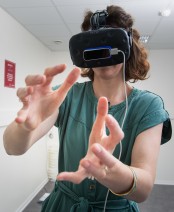Proving that one knows a secret without revealing it, the future of blockchain?


At the beginning of 2009, bitcoin was created, a fully digital currency based on blockchain technology. However, a blockchain offers few guarantees of confidentiality because the records are public. This is why two young researchers, Sarah Bordage and Youssef El Housni, are exploring other options for introducing confidentiality into blockchains as part of the "Blockchain & B2B Platforms" Chair, headed by Daniel Augot (Inria research director and professor at the École polytechnique) and Julien Prat (CNRS research director at the Centre for Research in Economics and Statistics (CREST*) and professor at the École polytechnique), and supported by Capgemini, Nomadic Labs and the Caisse des Dépôts.
Their work is presented in the Chair's first outlook paper, which details recent advances in the implementation of Zero Knowledge Proofs (ZKP) as privacy protection methods in public blockchains. This perspective paper, aimed at decision-makers, illustrates the industrial interest of these techniques through exchanges with Anthony Simonet-Boulogne and Gilles Fedak from iExec (which has developed a marketplace for computing resources - computing power, data sets and applications - on the Ethereum blockchain).
Currently, the security of blockchains relies mainly on electronic signatures and the use of hash functions. Hash functions take any form of information as input and match it with a code (a string of characters) of fixed length, called a hash. These functions are constructed in such a way that any change (however small) in the input information results in a complete change in the hash. Moreover, from a hash it is impossible to retrieve the corresponding input information. Thus, it is possible to store the hash of a password in a database rather than the password itself. The stored hash is compared to the hash of the password entered by the user to verify that the password entered is correct. By comparing hashes, it is therefore possible to check whether two documents are identical without being aware of them.
Zero knowledge proofs refine this mechanism by making it possible to prove on the basis of a hash that a property of the hashed document is verified, without disclosing any other information. For example, from a passport, one could extract information that proves that the person is of age, without having access to all the information in the passport, or even the exact age of the person. "In this way, you can prove that you know a secret without revealing it. This concept of zero-knowledge is so astonishing and promising that it earned its inventors, Shafi Goldwasser and Silvio Micali, the Turing Award in 2012," explains Daniel Augot. At present, however, ZKPs are rarely used. Indeed, it is necessary for one algorithm to compute the proof and another to verify it, which entails an additional cost in terms of time and computing resources.
This first perspective document of the Chair details interviews with Sarah Bordage and Youssef El Housni, two young researchers from the Computer Science Laboratory of the École Polytechnique (LIX*) conducting their research within the framework of the Chair under the responsibility of Daniel Augot in order to enrich systems allowing the implementation of ZKPs. Their work focuses on SNARKs and STARKs, two types of cryptographic proofs and their integration into blockchains. In this document, the expertise provided by the company iExec enriches the analysis of the difficulties of integrating these cryptographic proofs.
>> The Chair has welcomed two new sponsors this year, read the press release here
*CREST: a joint research unit CNRS, École Polytechnique - Institut Polytechnique de Paris, ENSAE Paris - Institut Polytechnique de Paris, GENES
LIX: a joint research unit CNRS, École Polytechnique - Institut Polytechnique de Paris in partnership with Inria-Saclay
>> about the Chair :
Through four axes, cryptography, consensus, smart contracts, and digital assets, the "Blockchain & B2B Platforms" Chair, supported by Capgemini, Nomadic Labs, and the Caisse des Dépôts, supports a research team and offers teaching on blockchains. Led by Daniel Augot and Julien Prat, the Chair aims to answer the questions raised by the application of blockchain to areas such as health data, supply chains, decentralised finance, central bank digital currencies, or sustainable development projects.
> Video presentation of the Chair








